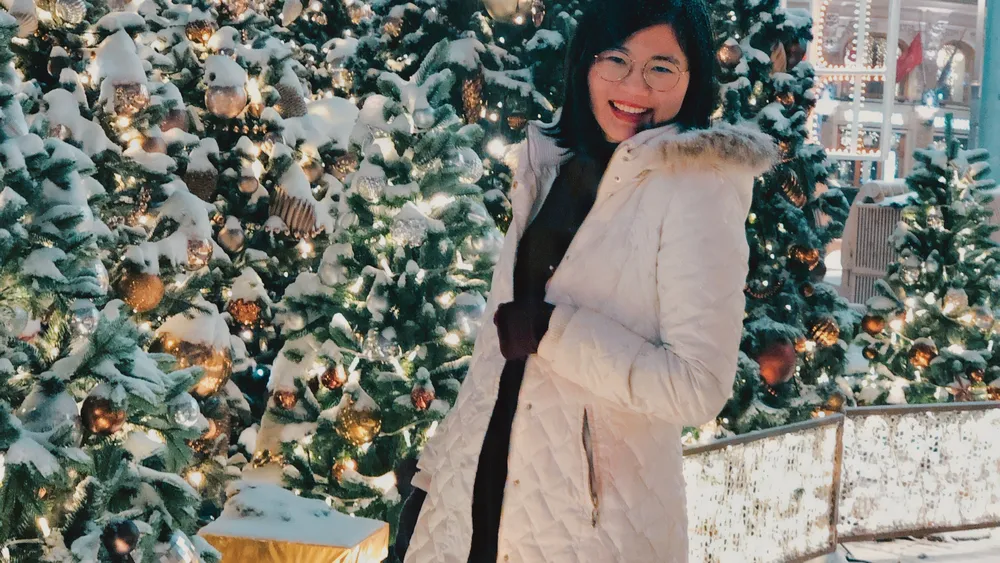"DH is a way of learning rather than a subject or a discipline": An interview with Jianing Zhao '20
28 May 2020

In the coming days, the Princeton community will celebrate (virtually) the Class of 2020. Among those slated to graduate is Jianing Zhao, who will receive her degree in Slavic Languages and Literatures along with certificates in Archaeology, Theater, and Humanistic Studies. Jianing is unique in the Class of 2020: she is the only senior pursuing the pathway on digital approaches to the humanities within the Certificate Program in Humanistic Studies.
Jianing got involved in digital humanities during her sophomore year after an article on DH piqued her interest. She enrolled in “ Virtual Victorians,” co-taught by CDH Faculty Director Meredith Martin and Miranda Marraccini *19, then a CDH graduate fellow. Jianing also served as an undergraduate assistant at CDH, where she worked on Derrida’s Margins, and she recently submitted a DH-focused thesis on a Russian émigré library in Paris.
We caught up with Jianing to hear more about her experiences in DH at Princeton.
What is your favorite Princeton DH memory?
Going to Marburg, Germany, with the Slavic Digital Humanities Working Group!
Learning about digital mapping methods, projects, and conceptual frameworks for one week straight, I overcame my (longstanding but hidden) fear of maps, developed the topic for my thesis, switched my major to Slavic, and got to know some of the best mentors of my undergrad years—Natasha Ermolaev, CDH’s associate director, who later traveled to Moscow with me for research, and Katherine Reischl, who became my departmental advisor. I experienced what an academic conference/workshop is like, which gave me courage to later apply to and present at other conferences in the US and abroad. I also fell in love with Germany during this first, unusual visit, and started learning German the year after. Overall, a formative experience that came with lots of great apfelwein. [Read more about Jianing’s experiences on the trip here.]
How has your interest in DH shaped your other academic (or non-academic) interests?
When exploring CDH’s various projects, I discovered the Shakespeare and Company Project. I initially wanted to join the Project as a research assistant, but while it did not work out logistically, I found out about a Russian émigré library in Paris, active around the same time as Shakespeare and Company, a library for American/English-speaking expatriates. I therefore decided to do a parallel project to the Shakespeare and Company Project as my thesis. Though it has turned out to be too ambitious of a goal to accomplish in two years by mainly just myself, I did manage to acquire most of the dispersed archival materials with Natasha’s help and build a foundation for future iterations of this project if the CDH or I continue working on this. My interest in DH, and in this project in particular, pushed me to be more data-oriented. Most of my coursework, papers, and non-academic projects are on the literary or artistic side, so it is refreshing to engage a more analytical part of my brain for my DH thesis.
DH also makes me more comfortable with learning software as a humanist. I learned to code (albeit at a somewhat basic level) in Python, make a map, test out various OCR methods, and build a website during my thesis research. When I was taking a history/archaeology class last semester, I was surprised at how quickly I learned to use Sketch Up, a 3D modelling tool, without any formal instructions or guidance. I then realized that my exposure and training in DH over the past years plays a part in this. DH is a way of learning rather than a subject or a discipline.
What would you tell other students about pursuing DH at Princeton?
The CDH is such a hidden gem at Princeton—everyone working there is so friendly and helpful, not to mention that there is always good coffee and chocolate. I wish more students could walk into the B-level of Firestone and have their mind blown, their academic trajectory completely changed. Worst case, you learn a lot about maps and data, which is always a useful thing, especially in this crazy world we’re living in right now!
Congratulations to Jianing and all of the members of the Class of 2020!
This interview was conducted via email during the week of May 18. Responses have been lightly edited.